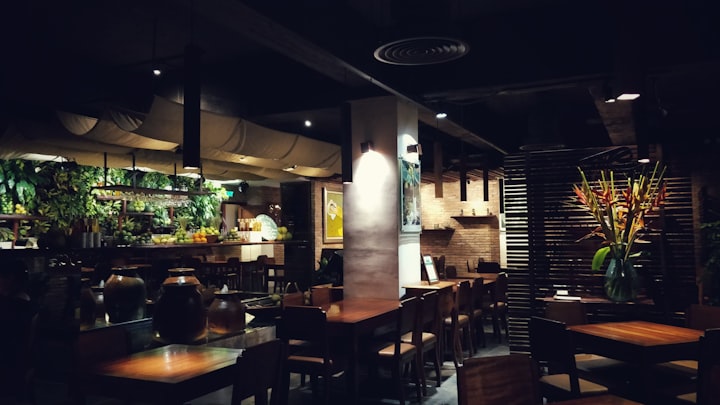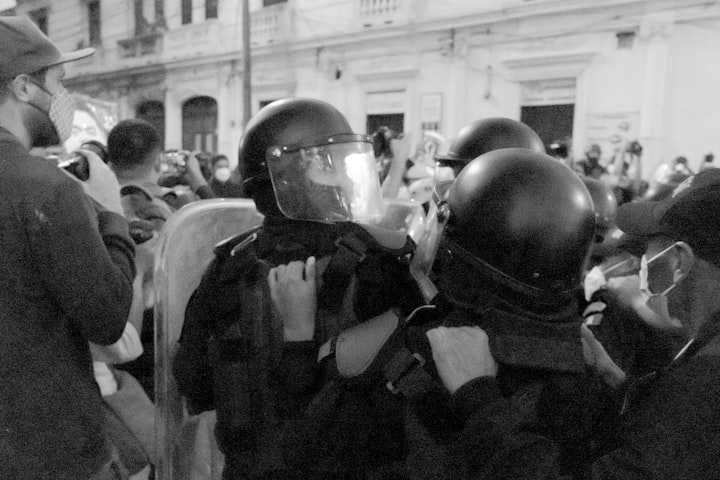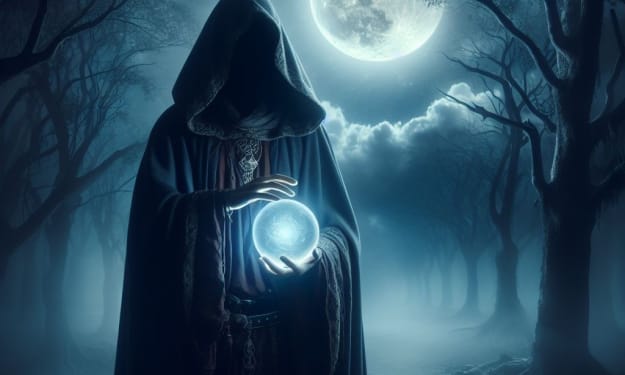The Human Gift
The Freedom to be Free from Freedom

ViceCollin fell from the ostensible comforts of his chair when he succeeded yet again in separating his mind from his body. His vision lingered on the perimeter of its blank stare, not seeing the paintbrushed clouds whispering in the wind ten thousand feet above him, or the kaleidoscopic butterfly coveting his attention.
It had chosen the wrong moment, for ViceCollin wasn’t there. He inhabited a world in and of his mind, without problems, without distractions from the exploits of enlightenment, where everything was equal, valid, and true. All knowledges were unified. Never could a thought be overly broad or sour, abstract, unfresh or overused; never could wandering butterflies bother him in his studies. ViceCollin had cultivated his skill for years, and no one else could do it as well as he.
Of course, ViceCollin assumed whoever else possessed the rare talent remained silent about it, as he did. He worried what people might think if he told them. What if they lose confidence in the friendship and wonder: Is ViceCollin really here, listening to what I am saying, or is he somewhere else, dissecting the ins and out, brights and dulls of cantaloupe breeding or dinosaur racing, compare-and-contrasting barndoors, brilliance metering or strength-empathy, not listening to me talk about my problems with my girlfriend, or about my mother’s blue hair?
Worries like this occurred to ViceCollin daily, such that he didn’t want to be friends with anyone sometimes. Life would just be easier, he said to himself in bed, if I could just go it alone, think things out my own way, never worrying about anyone else’s problems, or anyone else’s mother. Why can’t I just sacrifice my human needs, like the priests do, for a higher purpose…
…The higher purpose of myself.
ViceCollin didn’t like the sound of that; it was distressing, unsettling. In fact, when he thought about it in such rawly simple terms and brazen, painy urgency, he would wander to the special room in his house, or perhaps to the broom closet of the building where he worked, or, if he found himself at a restaurant during a business meeting, ViceCollin might use the restroom, and separate from his body as he would from a debt. If somebody came in and saw him, he said to himself, Well, my parents always told me not to care what other people think of me. And then, when the person was gone, ViceCollin was ashamed of his behavior and knew the person was offended in some way. There was no way around it, particularly outside the comfort of his home.
Once or twice, he resolved to quit entirely, to stop separating his mind from his body, stop excluding everything else, but oh too many times, he came back to the same realization: So few people can do what I do, so few people have this ability, or if they do, they don’t talk about it. Why should I give up such a rare and beautiful gift? For other people’s feelings? No! If I enjoy it, if I decide to do it, then By God I’m going to keep doing it, and hang everything else.
But ViceCollin couldn’t help feeling guilty after his assumed offenses found their mark in the hearts of perfect strangers. He wondered if he would ever be free of his guilt, free of what he knew was his conscience… and this worried him too, and hurt him: the desire to be free of conscience. He could not comprehend it, even though he wanted it deeply. When he would separate, he often imagined a world without conscience, where he could do whatever he wanted, whenever he wanted, and to whomever, and no one would be hurt or offended, because without conscience or morality or contrived value systems, there would be no impulse to be offended, no connotations of evil since no good or evil exists. That would be perfect, ViceCollin thought on a regular basis. Perfect.
Then I wouldn’t have to hide my ability anymore, because nobody would wonder if it was a good thing, or if I was listening when they spoke. Nobody would be offended upon entering the restaurant restroom, only to see me crouching in the corner, my eyes fixed on nothing, smiling, a dribble of saliva tiptoeing down my chin, while my mind arranges the attractive blond I saw earlier into a promising position, or realizes a world free of earthquakes, or laughs at another’s misfortune, or frees the world from sadness, sin, misery, death, guilt, and responsibility.
ViceCollin is free in this world, and people take what they need from him. It doesn’t matter, not one fig, because nothing dictates that the things belong to him or that he even needs them, wants them, or cares about them. He is free to care about absolutely nothing, except what he devises in his own mind. And ViceCollin’s exemplary mind, the mind that doesn’t need its body, is already so liberated; the entire universe is free to him compared to what was denied him now, here, in the “real” world.
But what was it, he asked himself? He resisted closemindedness; ViceCollin wasn’t always certain, after all. What was he being deprived of, by worrying about Joe Schmo’s feelings? ViceCollin could never find an answer to this question, and yet he knew there was one. Truth? People? Love? Care? Attention? Regret at his absence? All these things, and yet none of them. At times like these, he wished to be free from his gift.
He would decide to never use it again, never again disappear from the face of the earth, never again take refuge behind his face, behind his eyes where his vision is sharper than 20/20, closer to ∞/∞, and all knowledge is open to him. All truth is valid there, and he is the arbiter of it all. Any sight is his, any experience, any place, all within the reach of the “senses”. Any possession, any woman, any man, any friend, any freedom, any happiness, any sadness, any person, any sensation…
His mind could conjure them all into a world of static persistence, unlike the things in real life: the pile of work to do on his desk, the funny moment on TV, the birthday cake that molded over because he didn’t want to eat it and see it gone, the periods of health and cleanliness that seemed so infinite before being stained by discomfort or disgust, the feeling of being okay in his life, with or without his gift…All these things vanished from sight and left him alone. Dubious memories came and went like days or strangers on the street, passing into forgetfulness and reappearing for guilt, or greed, for longing, or shame, nostalgic for a time when ViceCollin didn’t feel worthless compared to his past. ViceCollin, without bravery, lost, frazzled, and unfailing, gave in and watched himself yield once more to the glories of his gift. What freedom.
He was gone for longer and longer periods of time. His boss arrived at his cubicle and roused him, or a restaurant patron checked if he was all right, or else he reappeared to himself the following morning and had no memory of where the nighttime went. And ViceCollin pretended it didn’t matter even though he knew, he knew, it’s bad for the memory to lose chunks of time, to be alone for that long.
He wanted to lose it all. Never return. Secretly, he hoped someday to separate his mind from his body and be unable to reunite them. Though he knew he would miss his friends, his family, his coworkers, his hobbies, his life, he would not know it, not be aware of it, because these things would become as foreign to him as his mutterings in sleep were to his parakeet.
That bird—Twinkie, he called him—ViceCollin would miss him most of all. Those plain, unshielded eyes, that clear, voice-like squawk-chirp. That bird needed nothing from him, felt nothing. Twinkie was only there, seeing him, acknowledging him, needing him. Nothing more. This was all ViceCollin really wanted. To be seen, acknowledged, needed. In his separated world, ViceCollin saw himself, acknowledged himself, needed himself, yet he knew this was tautology. He knew this was what was wrong with it all. Wrong with him. Wrong with the world.
That bird knew his every move, habit, exercise, inclination. It knew his middle name, his bedtime, his bench-pressing record, his height, how he took his tea and what kind of deodorant he used. The only thing Twinkie didn’t know was his heart.
How could it, it’s incapable. How could anyone? No one cares, he said to himself. No one. Not even me. Do I even know it? He asked with impunity. And then, when he was done wondering and started worrying, ViceCollin separated his mind from his body and was done with it. No one was the wiser, and he even asked himself once, Is this just the way I really want it? Is that why nothing ever changes? Why it will never come to an end?
Why won’t someone give me something beautiful? Why won’t I feel worthy, present, necessary, except in the verisimilitude of my mind? Is that the best the world can do? The most I’m good for? The most I deserve?
He sat in a restroom one day and asked himself all this. He went in, of course, to separate his mind from his body and learn how to cure cancer. It was becoming his habit, more and more, to ask himself if this reliance on his gift was the best thing for him, or the only thing for him. ViceCollin rested his head on his hand and looked at the brick-filled view of the window. What was he doing in there? What am I sitting here for? Am I going to stand for this, be victim to this once more? A gift isn’t worth anything if one becomes used to it.
Just then, a man in a long wool overcoat entered the restroom and hurriedly began to unbuckle his belt. This brought ViceCollin jumping to his feet.
“A wonderful thing, public bathrooms, ain’t they?” he said, almost yelling. The man grunted and paused, still in the process of exposing his backside.
“Uh, yeah, sure, I guess so.”
“I mean the law states that every restaurant must have a bathroom on the premises.” ViceCollin waved his arms in the air. “Isn’t that something?”
“I guess I’m kinda used to it. Now, will you please let me take a shit?” the man said, nodding.
“You bet your sweet Aspercreem, I will, and so will the law,” ViceCollin said, slapping together his hands in triumph.
He was proud of himself; for once, he had prevented the possibility of making a bad impression, of seeming strange or unusual, to the other people who used the restroom.
What would be ViceCollin’s next act of revolt? He bounded outside.
There, in the restaurant, a beautiful woman with long red hair sat at a table by herself. She wore a red dress, dark like overripe strawberries, which glowed under the pale orange light. Each time her gold-painted lips took a sip from her cup, her bold green eyes disappeared as she admired her reflection in the liquid before returning their steady gaze towards the door.
She admires herself most deservingly, thought ViceCollin. Deservingly. Yes, deservingly.
She appeared to be waiting for someone, and ViceCollin decided then and there and without hesitation: he would be that someone.
With ten long steps, he was there, in the chair across from her.
“I’m going to tell you something I have never told anyone else in my life,” he said, smiling.
“What?” she said, as though she hadn’t heard or believed.
“I have a unique ability, an ability very few people have. I realized it a few years ago but it is simply the most incredible thing that has ever happened to me and it continues to affect every day of my life.”
“What?” she said, in the same manner as before. She shook her head quickly as if trying to clear her vision.
“I can separate my mind from my body so my body can be doing one thing, and my mind can be doing something completely different: learning how to skin-dive, or flying a kite that’s a dragon, knitting a shirt with donkey hair or dancing on the walls of my enemy’s houses.”
“Really?” she said, looking incredulous.
“Yes,” he said. “In fact, I was about to go somewhere completely different in my mind, from where I am now. Somewhere we could be alone, just the two of us, you and I, and maybe you could ask me what it’s like to be separate from reality, free of it, whenever I choose, no restrictions, complete freedom.” ViceCollin knew this wasn’t quite true, but he had a strong feeling the woman didn’t know that.
“That’s not true,” she said.
“What? What part?”
“I can do it too, what you do, and I know it’s not true. It’s not true, it’s just not true, it’s not true, it’s not true…”
Her disintegrating voice said it over and over again, a tear rolling down her face and into her drink. ViceCollin watched a ripple expand from the center of the glass and was gone. He stood up and stared at her, and backed away slowly so she could resume what she was doing. Soon, she did, silently, a small sticky tear of saliva dribbling from her now-smiling lips to seal the deal.
ViceCollin looked around and realized that all the people in the restaurant sat alone, like her, eating nothing, their eyes seeing only themselves in a perfect world where their empty tables were filled with loving guests, with the bodies of dead enemies, with dozens of naked, submissive slaves, or with themselves dead and buried, the world at their funeral.
In his horror and disbelief, ViceCollin sat down on the floor, and joined them.
About the Creator
Aulos.Media
I'm working on my webnovel, "Binary Shadows: The Prize of the Cybernaughts." I have 47,000 words so far. Once I reach 100,000, I'll start posting it on Royal Road.
I like....lots of things.
IG and TW: @aulos.media






Comments
There are no comments for this story
Be the first to respond and start the conversation.